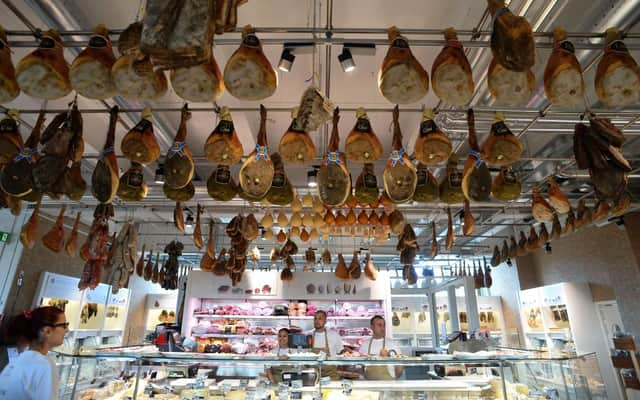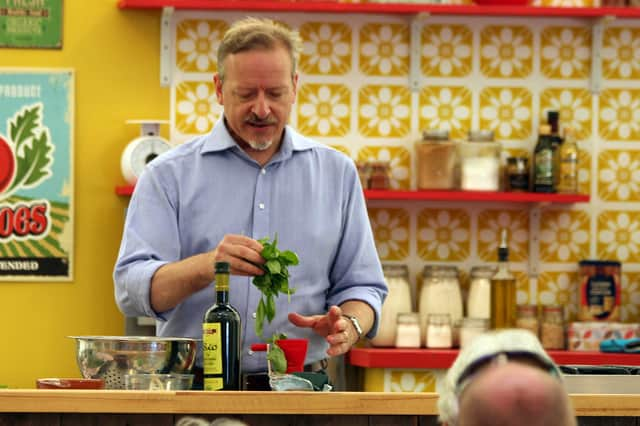Brexit: new import checks on EU olive oil and cheese will add £2bn to bill and push up inflation, report finds
and live on Freeview channel 276
New post-Brexit import checks on meat, dairy and plant products will add a bill of £2 billion to consumers, a new report has found.
The Allianz Trade economic insights paper also found the measures, which are being introduced throughout the year, could push up inflation. Rishi Sunak is building his whole election campaign on economic competence, and bringing inflation down is a key part of that.
Advertisement
Hide AdAdvertisement
Hide AdGoods from Britain have faced EU controls since it left the bloc’s single market at the start of 2021, but the UK has repeatedly put off checks in the other direction. The new border model was delayed five times due to inflationary fears, but finally started being implemented in January.
From 30 April, importers will have to pay up to £145 to bring small amounts of products such as cheese, salami and fish through the port of Dover or the Eurotunnel. The fee is intended to cover the cost of operating the border control posts introduced after Brexit, and will not apply to goods brought into the UK for personal use. Previously, when Britain was part of the European Union, meat and dairy produce could be imported without checks.
Importers and trade bodies have warned this will push up prices for consumers, and this has been backed up by Allianz’s report. It says the measures will effectively impose a 10% tariff of imports of cheese, olive oil and salami from the continent.


It said: “The cost of goods imported from the EU is likely to rise as exporters in the EU will pass on (at least part of) these additional costs to their UK customers … with dairy, meat and fish products most affected.” Allianz Trade predicted this could add around 0.15% to inflation, however this would be tempered by a two-year tariff suspension the government has brought in.
Advertisement
Hide AdAdvertisement
Hide AdSmall businesses and importers have reacted with fury to the new import charges, which were announced less than a month before their introduction. Paolo Arrigo, managing director of Seeds of Italy, imports the historic Italian Franchi seed brand to the UK, which has been in the same family for seven generations. He sells endangered, regional and heritage seed varieties to wholesalers, garden centres and the Royal Horticultural Society.
He told NationalWorld: “I’m despondent - we feel like we’ve been thrown under the bus. I’m standing in front of 12 cases of seeds which have to be incinerated in the next five days. They cost £4,000 but fell foul of the paperwork.”


Arrigo will now have to arrange a phytosanitary certificate and plant passport for each variety he imports. As the businesses specialises in rare and endangered seeds from artisan producers, he’s worried this will lead to huge bills.
“This is going to kill horticulture in this country,” he said. “This was one of the best reasons for staying in the EU, for uniformity. Now I need to use 29 different labels for everything.”
Advertisement
Hide AdAdvertisement
Hide AdA separate report, from the UK in a Changing Europe think tank, found that the UK has “little choice” but to follow a swathe of new EU regulations, in order to sell into the single market. Far from British businesses being free from new Brussels “red tape” after Brexit, many of the rules will de facto apply as firms must comply to maintain access.
Joël Reland, author of the UKICE Divergence Tracker, said: “The UK is living next door to a regulatory behemoth, which it cannot afford to ignore. Even after Brexit, the EU remains the UK’s chief export market, so British businesses have little choice but to conform with new EU regulations. The main difference is that now the UK government has no means of influencing EU policy decisions from the inside.”
Commenting on the Allianz Trade figures, a government spokesperson said: “We do not recognise these figures. These checks will have a minimal impact on food prices and consumers, while saving traders and businesses around £520m each year compared to the model originally proposed. Our border checks are fundamental to protecting the UK’s food supply chain, farmers and natural environment against costly diseases reaching our shores.”
Ralph Blackburn is NationalWorld’s politics editor based in Westminster, where he gets special access to Parliament, MPs and government briefings. If you liked this article you can follow Ralph on X (Twitter) here and sign up to his free weekly newsletter Politics Uncovered, which brings you the latest analysis and gossip from Westminster every Sunday morning.
Comment Guidelines
National World encourages reader discussion on our stories. User feedback, insights and back-and-forth exchanges add a rich layer of context to reporting. Please review our Community Guidelines before commenting.
